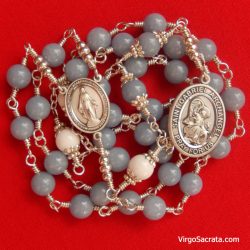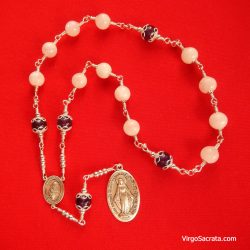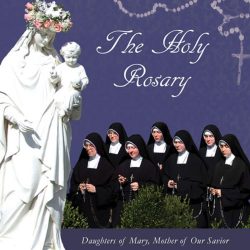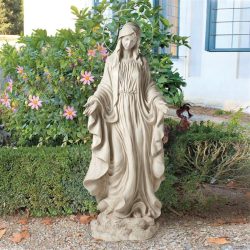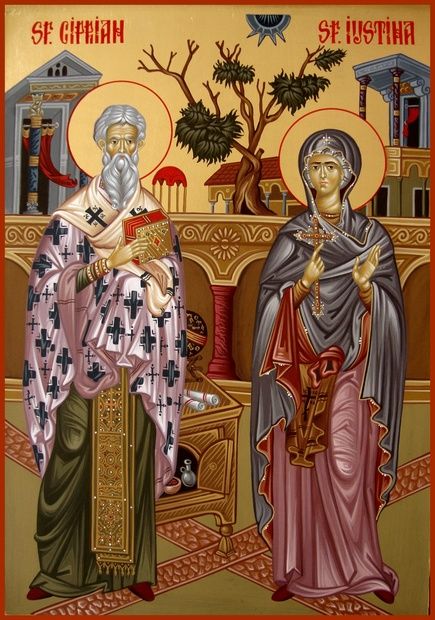

You abandoned ungodly darkness, becoming a light of truth; you were illustrious as a pastor; you were glorified in contest: O righteous Father Cyprian together with godly Justina, intercede for us before God the Creator of all!
You turned from the art of sorcery to the knowledge of God, and were shown forth as a skilful healer for the world, Cyprian, inspired by God. Together with Justina you grant cures to those who honor you; with her, pray to the Master who loves mankind that He may save our souls.
Saints Cyprian and Justina are venerated in the Catholic Church and Eastern Orthodox Church, who in 304, during the persecution of Diocletian, suffered martyrdom at Nicomedia (modern-day İzmit, Turkey) on September 26.
The Life of Sts. Cyprian and Justina gives one of the fullest accounts in Christian literature of sorcery and its power over men—and its final defeat by the power of Christ. It is not the product of someone’s imagination, but is based on the first-hand testimony of one who was a leading servant of the demons himself.
“Neither let there be found among you any one that shall expiate his son or daughter, making them to pass through the fire: or that consulteth soothsayers, or observeth dreams and omens, neither let there be any wizard, Nor charmer, nor any one that consulteth pythonic spirits, or fortune tellers, or that seeketh the truth from the dead. For the Lord abhorreth all these things, and for these abominations he will destroy them at thy coming. Thou shalt be perfect, and without spot before the Lord thy God.” [Deuteronomy 18:10-13]
Volume IX: September: The Lives of the Saints, 1866, By Rev. Alban Butler (1711– 1773)
ST. CYPRIAN, surnamed the Magician, was an illustrious instance of the divine grace and mercy. He was a native of Antioch, (not the capital of Syria, but a small city of that name, situated between Syria and Arabia,) which the Romans allotted to the government of Phœnicia, to the jurisdiction of which province this martyr was subject.
The detestable superstition of his idolatrous parents put them upon devoting him from his infancy to the devil, and he was brought up in all the impious mysteries of idolatry, judicial astrology, and the black art. In hopes of making great discoveries in these infernal pretended sciences, he left his native country, when he had grown up, and travelled to Athens, Mount Olympus in Macedon, Argos, Phrygia, Memphis in Egypt, Chaldæa, and the Indies, places at that time famous for superstition and magical arts.
When Cyprian had filled his head with all the extravagances of these schools of error and delusion, he stuck at no crimes, blasphemed Christ, and committed secret murders, to offer the blood, and inspect the bowels of children, as decisive of future events. His skill was employed in attempting the modesty of virgins; but he found Christian women proof against his assaults and spells.
There lived at Antioch a young lady called Justina, whose birth and beauty drew all eyes upon her. She was born of heathen parents, but was brought over to the Christian faith, and her conversion was followed by that of her father and mother. A pagan young nobleman fell deeply in love with her, and finding her modesty inaccessible, and her resolution invincible, he applied to Cyprian for the assistance of his art.
Cyprian was no less smitten with the lady than his friend, and heartily tried every secret with which he was acquainted to conquer her resolution. Justina, perceiving herself vigorously attacked, studied to arm herself by prayer, watchfulness, and mortification against all his artifices and the power of his spells. “She defeated and put to flight the devils by the sign of the holy cross,” says Photius, from Eudocia.
St. Cyprian writes in his Confession: “She armed herself with the sign of Christ, and overcame the invocation of the demons.” St. Gregory Nazianzen adds: “Suppliantly beseeching the Virgin Mary that she would succour a virgin in danger, she fortified herself with the antidotes of fasting, tears, and prayers.” Cyprian finding himself worsted by a superior power, began to consider the weakness of the infernal spirits, and resolved to quit their service.
The devil, enraged to lose one by whom he had made so many conquests of other souls, assailed Cyprian with the utmost fury, and, having been repulsed in several other assaults, he at length overspread the soul of the penitent sinner with a gloomy melancholy, and brought him almost to the brink of despair at the sight of his past crimes. God inspired him in this perplexity to address himself to a holy priest named Eusebius, who had formerly been his school-fellow: by the advice of this priest he was wonderfully comforted and encouraged in his conversion.
Cyprian, who, in the pressure of his heart, had been three days without eating, by the counsel of this charitable director took some refreshment, and, on the following Sunday, very early in the morning, was conducted by him to the assembly of the Christians; for though it was forbidden for persons not initiated by baptism to assist at the celebration of the divine mysteries, this did not regard other devotions, to which such as were under instruction in the faith might be admitted.
These assemblies were then held very early in the morning, both to watch in prayer, and for fear of the heathens. So much was Cyprian struck at the awful reverence and heavenly devotion with which this act of the divine worship was performed, that he writes of it: “I saw the choir of heavenly men, or of angels, singing to God, adding at the end of every verse in the psalms the Hebrew word Alleluia, so that they seemed not to be men.” Every one present was astonished to see Cyprian introduced by a priest among them, and the bishop was scarcely able to believe his own eyes; or at least to be persuaded that his conversion was sincere. But Cyprian gave him a proof the next day by burning before his eyes all his magical books, giving his whole substance to the poor, and entering himself among the catechumens.
After due instruction and preparation, he received the sacrament of regeneration from the hands of the bishop. Agladius, who had been the first suitor to the holy virgin, was likewise converted and baptized. Justina herself was so moved at these wonderful examples of the divine mercy, that she cut off her hair in order to dedicate her virginity to God, and disposed of her jewels and all her possessions to the poor.
St. Gregory Nazianzen beautifully describes the astonishing change that was wrought in Cyprian, his edifying deportment, his humility, modesty, gravity, love of God, contempt of riches, and assiduous application to heavenly things. The same father tells us, that, out of humility, with earnest entreaties, he prevailed to be employed as sweeper of the church. Eudocia, quoted by Photius, says he was made door-keeper; but that, after some time, he was promoted to the priesthood, and, after the death of Anthimus the bishop, was placed in the episcopal chair of Antioch. Joseph Assemani thinks, not of Antioch, but of Damascus, or some other city in Syria.
The persecution of Dioclesian breaking out, Cyprian was apprehended, and carried before the governor of Phœnicia, who resided at Tyre. Justina had retired to Damascus, her native country, which city at that time was subject to the same presidial; and, falling into the hands of the persecutors, was presented to the same judge.
She was inhumanly scourged, and Cyprian was torn with iron hooks, probably at Damascus. After this they were both sent in chains to Dioclesian, residing at Nicomedia, who, upon reading the letter of the governor of Phœnicia, without more ado, commanded their heads to be struck off: which sentence was executed upon the banks of the river Gallus, which passes not far from the city of Nicomedia.
Theoctistus, also a Christian, was beheaded with them for speaking to Cyprian as he was going to execution. Their relics were procured by certain Christians who came from Rome, and were carried by them thither on board their vessel. In the reign of Constantine the Great a pious lady, named Rufina, of the family of Claudius, built a church in their memory, near the square which bears the name of that prince. These relics were afterwards removed into the Lateran basilic.
If the errors and disorders of St. Cyprian show the degeneracy of human nature corrupted by sin, and enslaved to vice, his conversion displays the power of grace and virtue to repair it. How strangely the image of God is disfigured in man by sin appears by the disorders of his spiritual faculties, the understanding, and will in which the divine resemblance was stamped in the creation.
Not only beasts and other creatures have revolted from his dominion, and the shattered frame of his body is made a prey to diseases and death, but his will is rebellious, and the passions strive to usurp the empire, and destroy in his soul the government of reason and virtue.
Also the understanding, that should be the eye to the blind will, is itself blind, and the light within us is become darkness. In the state of innocence it was clear, serene, and free from the vapours of the passions: it directed the verdict of the imagination and the senses, and gave to the soul, by intuition and without study, a full view into all speculative natural truths, suited to man’s condition; but its most valuable privilege was, that it taught man all the practical rules and notions of moral virtue firm and untainted, so that he carried this law in his bosom, and had but to look into his own conscience for the direction of his actions in the practice of all moral virtue, which, by the strong assistance of grace, was always easy to him. His understanding was also enlightened by a perfect divine revelation, and his will found no obstacle in the exercises of all theological and other supernatural virtues.
The most fatal consequence and punishment of his disobedience we deplore in the extravagances, folly, crimes, and errors into which men are betrayed when they become once enslaved to their passions. Religion and faith alone secure us from these dangers, enlighten our understanding, and offer us the means to restore the rectitude of the will.
NOTES: The Empress Eudocia, wife of Theodosius the Younger, (who chose her for his consort on account of her learning and skill in philosophy,) wrote the history of SS. Cyprian and Justina in a beautiful Greek poem, consisting of three books, commended by Photius, who has given an abstract of this work; but the poem itself is lost, with many other elegant poetical compositions of that princess. The authentic acts of these martyrs are likewise lost. But we have still extant the confession of St. Cyprian, written by himself, the same that was made use of by St. Gregory Nazianzen and Eudocia; also two other genuine pieces, the one entitled, The Conversion of Justina and Cyprian; the other, An Account of their Martyrdom. Also Prudentius, hymn. 13, p. 215. St. Gregory Naz. Or. 18, (though they, by mistake, confound this St. Cyprian with the bishop of Carthage,) and Photius, Bibl. Cod. 184, give us the history of these martyrs. On their Latin acts see Card. Baronius, &c. On the Greek of two sorts, Lambecius, Bibl. Impel. Vindeb. t. 8, p. 247, 257, 262. Montfauc. Bibl. Coislin. p. 210. See Tillemont, t. 5. Ceillier, t. 4, p. 89. Orsi, t. 4, p. 80. Jos. Assemani in Cal. Univ. t. 5, p. 269, ad 2 Oct.
PRACTICAL CONSIDERATIONS
I. Oh ! that all who desire to live chastely in their station, would learn of St. Justina, how they ought to conduct themselves when they are tempted to sin by Satan or by wicked persons. To receive letters or presents ; to have long, intimate and especially secret conversations with dangerous companions; to al low themselves to be caressed, is the sure way to great vices. “
A holy love,” writes St. Jerome, ” has nothing to do with presents, flatterng letters and caresses; for, all such things savor of the flesh and are far from a chaste love.” And again he says : ” Immodest flatteries, jesting, laughing and caresses, are the beginning, and a certain sign of the approach of the death of purity.”
Whoever detests sins against purity, let him guard against such a beginning ; otherwise he is lost. When you are assailed by force, imitate the chaste Justina. Flee, if you can ; but if this is not possible, resist courageously ; above all things, use your voice. Call as loudly as you can to God and men for help.
In this manner you will surely conquer any wicked person who would entice you to sin. If hell persecutes you with its temptations, let St. Justina be your model. Be not discouraged ; the devil cannot force you, even should he call all his hellish companions to aid him.
Prayer, the sign of the holy cross, calling to God and the Blessed Virgin, fasting, repeated resolutions not to be conquered, are such invincible weapons, that all hell cannot overcome him who makes use of them. Those who do not make use of them can blame themselves alone when they fall and go to perdition.
II. Cyprian and Aglaides were converted and became Saints, be cause Justina had so valiantly op posed their wicked schemes. Cyprian, to manifest how earnest he was in his conversion, cast his books and other instruments of his magic art from him.
Both gave thanks to Justina for defending her self so bravely, as it opened their eyes to see the brink of the precipice upon which they stood. All three rejoice now eternally in heaven. It is a great miracle of divine mercy, when a magician or an un chaste person reforms ; and this miracle God performed on Cyprian and Aglaides.
He is ready to work it on others also, who are addicted to vice, if they are only desirous to be converted. To be earn est, and to take due care not to of fend again against purity, it is necessary that nothing be kept back which has reference to the vice of unchastity, as dangerous books, immodest pictures and other objects which incite to unchastity. One must shun all the occasions of sin, and break off all sinful acquaintances.
If Justina had shown her self weak when tempted to sin, she would not have converted Cyprian and Aglaides. If she had consent ed and died with them in sin, she would now be with them in hell.
There they would now curse and execrate each other. Learn from this, how much good we may do by resisting sin, and how much evil by being weak. Those who would tempt you to sin, will one day thank you if you resist them fearlessly ; but they will curse and execrate you for consenting to their wickedness.
Battle, therefore, bravely against the evil spirit, and all others who assail you. ” Even unto death fight for justice.” (Eccles. iv.)

VIRGÓ SACRÁTA is a Christian mission-driven online resource and shop inspired from the beauty of Catholic faith, tradition, and arts. Our mission is to “Restore All Things to Christ!”, in continuing the legacy of Pope St. Pius X under the patronage of the Blessed Virgin Mary. “Who is she that cometh forth as the morning rising, fair as the moon, bright as the sun, terrible as an army set in battle array?” O Mary, conceived without sin, pray for us who have recourse to Thee.






